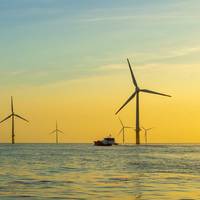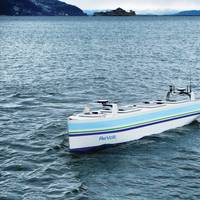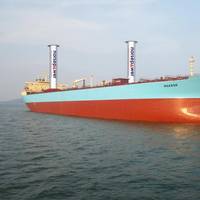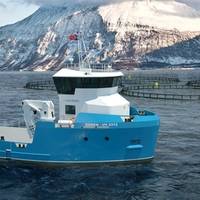Accelerating US CTV Market Development with Hybrid Solutions

As the world looks to renewable energy sources to combat climate change and reduce reliance on fossil fuels, offshore wind has emerged as a promising frontier in the United States. A report by the University of California Berkeley released in August concluded that due to the nation’s long coastlines with sustained winds in many areas and falling turbine costs, offshore wind could feasibly supply between 10% and 25% of the country’s energy demand by 2050.While that may paint a rosy picture of a cleaner…
Autonomous Ships, Opportunities & Challenges

Maritime autonomous surface ship (“MASS”) technology continues to advance at a rapid pace around the globe. Although it’s not being embraced as quickly in the United States commercial market as other parts of the world, U.S. industry professionals and regulators look forward to continued development and implementation as a means to improve efficiency and safety.OpportunitiesThe U.S. Maritime Administration (“MARAD”) hosted “Achieving Critical MASS: Spotlight on the U.S. Vessel Automation Industry” July 22 and 23, 2019, encouraging discussion between U.S.
Maersk Tankers to Trial Rotor Sails

Norsepower Oy Ltd. in partnership with Maersk Tankers, The Energy Technologies Institute (ETI), and Shell Shipping & Maritime, have announced that it will install and trial Flettner rotor sails onboard a Maersk Tankers-owned vessel. The project will be the first installation of wind-powered energy technology on a product tanker vessel, and will provide insights into fuel savings and operational experience. The rotor sails will be fitted during the first half of 2018, before undergoing testing and data analysis at sea until the end of 2019.
VOLT Orders Ship for Aquaculture Operations

In December 2016 Damen Shipyards Group signed a contract with Norway-based VOLT Service AS for a Utility Vessel (UV) 4312 to be delivered in Q1 2018. The vessel, to be named VOLT Processor, will undertake delousing operations and other services at Norwegian salmon farms. Remøy Management AS has been involved in the development of the project and will perform the building supervision. Remøy Management will be the manager of the vessel when delivered. The UV 4312 follows on from Damen’s smaller model – the UV 2410.
Train Lobby Pushes to Weaken Safety Rule
Billionaire investor Warren Buffett is set to be a chief beneficiary of a bid by Senate Republicans to weaken new regulations to improve train safety in the $2.8 billion crude-by-rail industry, a key cog in the development of the vast North American shale oil fields. A series of oil train accidents, including the July 2013 explosion of a train carrying crude in Lac-Megantic, Quebec, that killed 47 people, led U.S. and Canadian regulators to announce sweeping safety rules in May. Among other things, U.S. oil trains are required to install new electronically controlled pneumatic (ECP) brakes. But in late June, the Republican-controlled Senate Commerce Committee approved a measure to drop that requirement, and order years of new research to confirm the safety benefits of ECP brakes.
Pentair Opens Aquaculture Center of Excellence
Mindful that fish farming has the potential to help meet an expanding population's need for protein in a world with increasing water constraints, Pentair announced the opening of its Pentair Aquatic Eco-Systems' World Aquaculture Technology Engineering & Research Center of Excellence in Apopka, Florida. The center, which consists of 12,400 square feet of laboratories and fish culture systems, will be used for demonstration, research and teaching activities. Built to allow full connectivity to the Internet, customers and educational institutions will be able to monitor online the progress of fish culture trials, including water quality, feeding, feed conversion ratios, growth rates, energy consumption and harvesting activities.
MAN B&W Diesel Launches New Engines Series
The MAN B&W Diesel Group is launching a new four-stroke engine onto the market that not only burns both gas and MDO (Marine Diesel Oil), but can also run long-term on pure HFO (Heavy Fuel Oil). This flexibility meets and even exceeds all requirments from the marine as well as the stationary market. The 51/60DF (Dual Fuel) engine is based on the well-known 48/60B range, tried and tested in both marine and stationary applications. Its technology benefits from the experience that MAN B&W Diesel has gained over decades of working with smaller dual-fuel engines, most recently with the 32/40DF range. The 51/60DF is currently the largest four…
Secretary Slater Switches On Satellite Navigational and Positioning Systems
U.S. Secretary of Transportation Rodney E. Slater and South Dakota Senator Tim Johnson joined with Admiral James M. Loy, Commandant of the USCG, to officially switch on the latest satellite-based positioning technology, a federally required system that will benefit all 50 states as well as private industry. The ceremony marked the official availability of the Maritime Differential Global Positioning System (MDGPS) and its expansion into the Nationwide Differential Global Positioning System (NDGPS), which will extend the technology's benefits to all modes of the nation's transportation systems. The Differential Global Positioning System (DGPS) provides a significant advance in the application of satellite technology.





